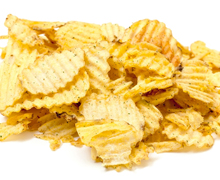
Ultra-processed foods, which contain many ingredients not commonly used in home cooking such as hydrogenated oils, high-fructose corn syrup, flavor enhancers and emulsifiers, can trigger an inflammatory response that can harm the body in many different ways. Researchers at the University of South Florida and Tampa General Hospital Cancer Institute have discovered that inflammation can drive tumor growth in the colon which may increase the chances of developing colorectal cancer.
Colorectal cancer is the second leading cause of cancer-related deaths in the US and it is believed by researchers the chronic inflammation as a result of ultra-processed foods and unhealthy oils is driving tumor growth. The study was designed to understand how the consumption of processed foods are preventing the body from successfully using its natural healing powers.
"It is well known that patients with unhealthy diets have increased inflammation in their bodies," said Dr. Timothy Yeatman. "We now see this inflammation in the colon tumors themselves, and cancer is like a chronic wound that won't heal—if your body is living off of daily ultra-processed foods, its ability to heal that wound decreases due to the inflammation and suppression of the immune system that ultimately allows the cancer to grow."
Yeatman says the typical Western diet with its inclusion of foods with added sugars, saturated fats, chemicals and seed oils are a source of unwanted inflammation within the body. Some of the examples of ultra-processed foods he is referring to sausages, snack foods, breakfast cereals, donuts, soft drinks and instant soups.
"Our bodies are designed to actively resolve inflammation through bioactive lipid compounds derived from the healthy fats, like avocados, that we consume," said fellow researcher Ganesh Halade. "Bioactive lipids are very small molecules derived from the foods that we eat and, if the molecules are coming from processed food products, they directly imbalance the immune system and drive chronic inflammation."
Halade and his colleagues studied tumor samples and looked at the trace amounts of lipids present. They observed an excess number of molecules that promote inflammation and a shortage of those designed to combat it and help the body heal naturally. They hope this finding will allow them to help find a way to restore that necessary balance.
"A human's immune system can be extremely powerful and drastically impact the tumor microenvironment, which is great if harnessed correctly for health and wellness," Yeatman said. "But not if it's suppressed by inflammatory lipids from processed foods."
